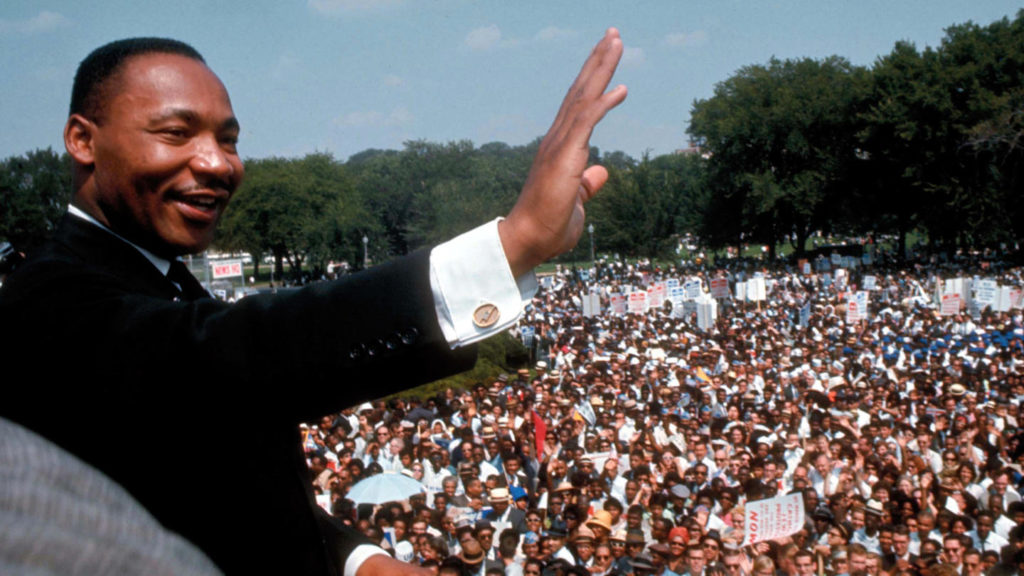On April 16, 1963, Martin Luther King Jr. sat on a thin mattress in a small Birmingham jail cell. In the narrow margins of a newspaper — the only paper he could find — he wrote a letter to opponents in hopes of helping them understand his position.
Since that letter was written almost 50 years ago, a lot has changed, but some things have not. One thing that has not changed is the perennial problem of people disagreeing, then fearing, and then hating each other.
We live in an extremely divided country. Many different ideologies are pushing people farther and farther from each other. Christians now find themselves in the minority on many issues and many practices throughout society, leaving them longing for justice and change. Christians should be seeking change in many areas of society, but how to bring change is difficult to know. Some are weary that change can even happen, but often the biggest issues are how to have conviction for change and also show grace and love to the people you differ with.
Combining conviction and love is lost on many today, but it was not lost on King.
Martin Luther King Jr.’s Letter from a Birmingham Jail is a powerful guide and example of opposing others with conviction and also grace. King is deeply thought-out, biblical, courageous, and provides immense wisdom on how to push for change, and today’s society could benefit from greatly from his insight. Over the past nine years, I have walked churches through significant organizational change that brought much opposition. Nothing has been more encouraging and insightful to me than King’s letter. I want to share seven takeaways from King’s letter that we should apply when pushing for change.
1. He did not seek to persuade every critic. If you do anything, someone will find something to fault. That was particularly evident with the firestorm of racial inequality that King sought to extinguish. He said in his letter, “Seldom, if ever, do I pause to answer criticism of my work and ideas … but since I feel you are men of genuine goodwill and your criticisms are sincerely set forth, I would like to answer your statement.” King didn’t deal with every critic, but he did seek to work with those who were reasonable. It’s a good word for us today that we need to pick our battles and not feel the need to respond to every critic, tweet, or review.
2. He reasoned. Today emotional hyperbole and antagonism reverberate, and it typically injures and destroys, rather than persuades or redeems. King’s letter uses lucid, cogent, and powerful reasoning. His goal for his letter was to respond to critics in “patient and reasonable terms,” which exemplifies Philippians 4:5 — “Let your reasonableness be known to everyone.”
Having walked people and organizations through significant disagreement and change, I know how hard it is to reason during intense differences. You are infuriated and offended by the other’s position, but you have to put animosity down, seek to understand them, hear and respond to their reasoning, and where appropriate educate them on your position. Reasoning brings people together and exposes the true issues, and this allows for real solutions to emerge.
3. He showed respect. How you do something is as important as what you do. You can win an argument and lose the battle. King did not seek to elevate his position by bringing others down. He sought to gain respect in a respectful manner. Harsh and demeaning rhetoric typically inflames people and situations. King certainly used strong words and arguments, but it was done on a foundation of love and respect. He was gracious and respectful to everyone, even to those who disagreed with him, even to those who jailed him, and even to those who would kill him. He reflected Christ in his persistent and grace-filled opposition to sin.
Differences in ideas must be voiced with deference for persons. How many times is injustice opposed with injustice? Differences emerge and immediately personal attacks begin. One person slanders another’s character or makes threats to remove their belongings from the office. King said, “Injustice anywhere is a threat to justice everywhere.” We ought to show deference in our words, essays, tweets, actions, and everything else. Injustice never fixes injustice. And as Scripture says, “Do not repay evil with evil” (Rom. 12:17).
4. He didn’t demonize. When differences emerge, people get offended and then outrage colors their view of the entire person. They stew on small offenses, which then become much larger and eventually lead to hate. The opponent is portrayed as Satan himself and the person or group’s basic dignity is questioned.
King is in a jail cell because he is black. How angry would I be if it were hazel eyes or brown hair or white skin that warranted such treatment? Despite that, King separated the errant views from their basic human dignity. He said racism was a disease that needed healing. He sought to heal the disease and not destroy the person. It’s said that on one occasion a lady came up to King and berated him with filthy language. He looked at her and said, “You are too beautiful to speak like that.” She later came back and apologized. Scripture says, “A gentle answer turns away wrath” (Prov. 15:1). Love is the greatest polemic.
Our country seems to be on edge about every event or issue, and a major reason for that is we fail to see any good in our opponents. King avoided this, even with the social atrocities of his day, and we certainly should be careful not to demonize those on the other side of issues today.
5. He gave opportunities to respond. King was in jail because of protesting, but he did not jump immediately to protesting. When facing legitimate wrongs, King took intermittent steps, and when those steps were not heeded, resistance increased. His intermittent steps allowed the opposition an opportunity to display their true colors. When people failed to respond to valid requests and warnings, then it became appropriate to increase pressure and apply consequences, which is in line with biblical approaches to correction (Ex. 21:28-29, Matt. 19).
For instance, when King first petitioned city leaders to remove demeaning signs, they agreed, but they failed to follow through on their promises. Few signs were removed, and those that were removed soon reappeared. This was clear evidence that stronger measures were needed. King did not sit idly. He brought direct action of protest. Pressure was applied, but only after initial steps failed. As we move toward change, it is important to give people time to contemplate and respond, and not just move immediately to ultimatums or blasts.
6. He accepted consequences. It’s no guarantee that speaking out for injustice will end well. Our Savior spoke the truth and was crucified by those He came to save. King graciously spoke out for inequality and was taken to a jail cell. Many today are devastated when they speak out on an issue and are not supported or are attacked. We take that risk every time we speak, and we must ask ourselves if we are prepared for that.
King would not allow people into his movement without first doing “purification.” They would ask recruits, “Are you able to accept the blows without retaliating? Are you able to endure the ordeals of jail?” We must do the same. Are you willing to engage in online debates without slandering? Are you willing to speak up for injustice even if your boss doesn’t like it? If you oppose the ideas of others, you will be targeted. You ought to count the cost before you engage in battle.
Indeed, Christians ought to count the cost of testifying to Jesus, because it will come at a cost. You may face rejection in the workplace. You will most certainly get bashed on Twitter and Facebook. Will you sulk or seek revenge, or will you gracefully stand strong with conviction and love in your eyes, as King did?
7. God intoxication. King lamented the modern church’s “weak, ineffectual voice with an uncertain sound,” and he called the church to regain the vision of God upon which it was founded. If we are going to stand up for righteousness, cast aside scorn, and show love and respect to those who slander and oppose, it will take the same return to God.
King said: “There was a time when the church was very powerful. It was during that period that the early Christians rejoiced when they were deemed worthy to suffer for what they believed. In those days the church was not merely a thermometer that recorded the ideas and principles of popular opinion; it was the thermostat that transformed the mores of society. Wherever the early Christians entered a town the power structure got disturbed and immediately sought to convict them for being ‘disturbers of the peace’ and ‘outside agitators.’ But they went on with the conviction that they were ‘a colony of heaven’ and had to obey God rather than man. They were small in number but big in commitment. They were too God-intoxicated to be ‘astronomically intimidated.'”
We need a vision of God that says what we have in Christ is so profound that we are willing to lose all things on earth in order to gain it. When we are intoxicated with the glory, the worthiness, and the splendor of our God, then we are ready to push for change in society in a way that condemns wrongs, respects others, and accepts sacrifices. This desire is not satisfied with political victories, financial success, or earthly fame, but with helping others see the greatness of our God.
Does the way you differ with others show you are consumed with the glory of God? If Christians are going to stand for change in a way that honors God, they must be intoxicated with nothing other than God himself.,
Published January 20, 2020


